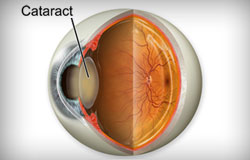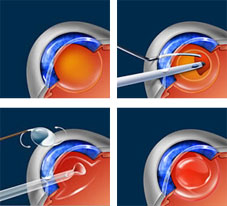
A cataract occurs when the natural lens in your eye becomes cloudy. Normally, light passes through the cornea (clear outer surface of your eye), through your pupil and then through the lens. The lens helps your see clearly by focusing the light onto the retina. Cataracts obstruct the passage of light and thereby impair your vision. They usually develop slowly and pain-free, leaving many people unaware of their gradual loss of clear vision in one or both eyes. After the cataract removal, an artificial lens implant is inserted. The lens replacement is much smaller than a dime and has been corrected to meet your eye’s specific refractive needs.

Cataract surgery is typically done on an outpatient basis and usually takes less than 15 minutes. Generally, topical anesthesia (numbing eyedrops) are used with gentle, light IV sedation. The cataract removal happens through the most advanced microsurgery. Your eye’s natural lens capsule is left in place to help support the artificial lens replacement that is inserted during the procedure.
Phacoemulsification (FAY-co-ee-mul-sih-fih-CAY-shun) is the newer, more common form of cataract surgery in which specially designed instrument is used to emulsify the cataract with ultrasound waves. The pieces are then vacuumed out. Only a very small incision, about 1/8 inch, is required in phacoemulsification. This procedure, commonly referred to as “phaco”, is now the most common form of cataract treatment surgery in the United States.
After cataract surgery, you may wear a protective shield at bedtime for the first week and you will use a combination of antibiotic and anti-inflammatory eyedrops for 3-4 weeks. There are usually no stitches or patches used after cataract surgery. Your eye may be mildly inflamed and feel a little scratchy and irritated for a couple of days after the procedure. Normal activities can usually be restarted immediately after surgery.
Laser vision correction, LASIK and ASA, can be used to fine tune previous cataract surgery to improve vision and decrease or eliminate the need for glasses.
 512.263.1113
512.263.1113